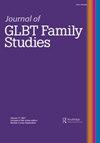Predicting Relationship Satisfaction in LGBQ + People Using Internalized Stigma, Outness, and Concealment
IF 2
Q2 FAMILY STUDIES
引用次数: 5
Abstract
Abstract Minority stress has a range of negative and protective outcomes for lesbian, gay, bisexual, queer, and other sexual minority (LGBQ+) people. The internalization of societal stigma associated with sexual minority relationships may impact decisions related to outness and/or concealment of one’s romantic relationship, which may affect the relationship. Building on previous research, we examined whether internalized stigma and sexual orientation concealment predicted lower romantic relationship satisfaction in LGBQ + people, and whether outness about one’s sexual orientation predicted better relationship satisfaction. We also examined whether outness and concealment mediated internalized stigma's effects on relationship satisfaction. Hierarchical regression results (N = 214) demonstrated that internalized stigma was a significant negative predictor of relationship satisfaction, outness was a significant positive predictor, and concealment was not a unique predictor. Mediation analysis demonstrated that internalized stigma had a significant direct effect on relationship satisfaction, along with a significant indirect effect through lower outness. Although internalized stigma was associated with greater concealment, concealment did not mediate the relationship between it and relationship satisfaction. Kelley and Thibault’s interdependence model, alongside minority stress theory, are used to understand these variables' effects on relationship satisfaction. Counseling and research implications are discussed.利用内化污名、外向性和隐蔽性预测LGBQ +人群的关系满意度
摘要少数群体压力对女同性恋、男同性恋、双性恋、酷儿和其他性少数群体(LGBQ+)有一系列负面和保护性的结果。与性少数群体关系相关的社会污名的内化可能会影响与浪漫关系的公开和/或隐瞒有关的决定,这可能会影响关系。在先前研究的基础上,我们检验了内化的污名和性取向隐瞒是否预示着LGBQ的恋爱关系满意度较低 + 人,以及对性取向的不了解是否预示着更好的关系满意度。我们还研究了显性和隐性是否介导了内化污名对关系满意度的影响。分层回归结果(N = 214)表明,内化污名是关系满意度的显著负预测因子,外向是显著正预测因子,而隐瞒并不是唯一的预测因子。中介分析表明,内化的污名对关系满意度有显著的直接影响,同时也通过降低outness产生显著的间接影响。尽管内化的污名与更大的隐蔽性有关,但隐蔽性并不能调节污名与关系满意度之间的关系。Kelley和Thibault的相互依存模型,以及少数群体压力理论,被用来理解这些变量对关系满意度的影响。讨论了咨询和研究的含义。
本文章由计算机程序翻译,如有差异,请以英文原文为准。
求助全文
约1分钟内获得全文
求助全文
来源期刊

JOURNAL OF GLBT FAMILY STUDIES
FAMILY STUDIES-
CiteScore
3.90
自引率
0.00%
发文量
0
期刊介绍:
The Journal of GLBT Family Studies is a much-needed resource on the working dynamics of the diverse family structures found in every corner of the world. This groundbreaking new journal addresses the vital issues facing gay, lesbian, bisexual, and transgender individuals and their families. Edited by Dr. Jerry J. Bigner, who has provided expert witness testimony in legal cases and in the litigation involving same-sex marriages in Canada, the journal features interdisciplinary studies and scholarly essays on topics related to GLBT family life and functioning as well as relationships with other families.
 求助内容:
求助内容: 应助结果提醒方式:
应助结果提醒方式:


